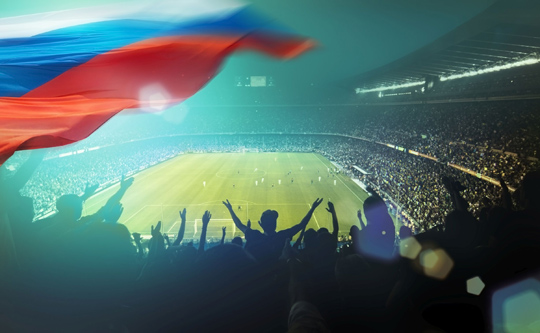Magic moments for Russian soccer
Freiburg, Jun 06, 2018
Not everyone views Russia as a classic soccer nation. That is a misconception, says Dr. Peter Kaiser from the Department of Modern and East European History at the University of Freiburg: The sport has a long tradition in this year’s World Cup host country. No one is expecting great things of the current team – nonetheless, the event carries a great deal of meaning for Russian soccer fans, explains the historian during a chat with Annette Kollefrath-Persch.

The 2018 FIFA World Cup will begin in Russia on June 14, 2018. Photo: Csaba Peterdi/Fotolia
Mr. Kaiser, the World Cup is about to begin in Russia in a few days. German fans can’t wait. What is the mood in the host country?
Peter Kaiser: The Russian soccer fans have been anticipating this event for years, ever since the day it was announced that the World Cup would take place in their country for the first time ever. Of course, the anticipation is also linked to the question as to how good your own team is.
Is soccer an entrenched sport in Russian society?
Yes, even if you don’t perceive Russia to be a soccer nation because it has, for instance, a stronger representation in ice hockey and other Olympic sports. But soccer has a long history in Russia, spanning back to the 1917 Revolution. And, at the very latest, in the 1930s soccer became the number one sport in Russia, perhaps not as a popular game, but as a main event for people.
What are some of the magic moments in history for Russian or Soviet soccer fans?
The pinnacle moments were during the 1960s: in 1956 the national team won the Olympic tournament in Melbourne, Australia completely unexpectedly. Their winning streak spanned an entire decade. In 1960 Russia was the first European champion. In 1964 the team won the title as European vice champion and in 1966 they made fourth place in the world championship in England. Thereafter, success pretty much eluded them. In 1972 they were once again European vice champion, but that was the final spark of their “glorious generation” from the 1960s.
Is the Russian national team under more pressure for this world championship?
Yes, there is pressure. They don’t want to humiliate themselves. But the Russian fans are realistic enough to know that the team is currently in a bit of upheaval. No one expects a miracle. But they do hope the team can deliver a good performance during the games they play. But one should also mention that the pressure is coming directly from the fans and not from the political sphere. Those times are long gone.

Like every other country, Russia aspires to show off its best side during the World Cup, says historian Peter Kaiser. Photo: Ingeborg Lehmann
Why has Russia, or the former Soviet Union, never wanted to host a World Cup before?
For one, there was always the problem that the then Soviet sports officials did not get along with FIFA, the International Federation. For another there was also a significant ideological argument: During Communism people made the claim that they were fundamentally superior to the capitalist bourgeois world in every respect.
But the Soviet party heads knew that their own team would not be able to win the home-based World Cup. The officials were not willing to lose face like that. In addition, they avoided high investment costs of building out their infrastructure. And you must not forget that the Soviet Union was a largely isolated surveillance state; they feared the many thousands of “capitalist foreigners” who would stream into the country and who could not be fully monitored.
What political aspect does the World Cup hold for President Vladimir Putin?
It is not so important for Putin whether the Russian team wins or not. For him it is more about conveying a certain image about Russia to the outside world and showing that, after the Olympic Winter Games they were able to pull off yet another enormous event. Yet more proof about the return to their “old greatness.” It is not important what kinds of problems they had during the stadium’s construction or how much money was squandered. That will be addressed later. But every nation aspires to showing its best features during such an event.
At soccer matches, there are also unsightly scenes: At the European Championships in 2016, Russian soccer fans were very visible because of their brutality.
These incidences are perceived very negatively in Russia. People say that hooligans have ruined Russia’s global reputation and they do not want to have that in their own country. There are multiple precautionary measures against hooligans in place. The police will certainly intervene well in advance. It will most likely come to violence at some point well beyond the game itself when aggressive hooligans from various countries encounter one another. But I image that 99 percent of the time it will be very orderly in the stadiums.
Who are your favorite Russian soccer players in history?
Most definitely the goalie Lew Jaschin: In my view he was a genius. There will never be a second player like him. He was part of the legendary team during the 1960s and an influential figurehead of that generation. I also really like Oleg Blochin, a Ukrainian forward who played for the Soviet Union in the 1980s. Incidentally, many Russian fans think that too, no matter what contemporary political development is.
What do you expect of the World Cup – both from an athletic as well as societal perspective?
I am a realist. By the round of the final 16 it will mean the end for the Russian team. But I am happy to be wrong in any case. From an athletic perspective it will be exciting and interesting on the whole. I hope the entire event will be a magical moment – not only for Russian politics, but for the normal fans too.

